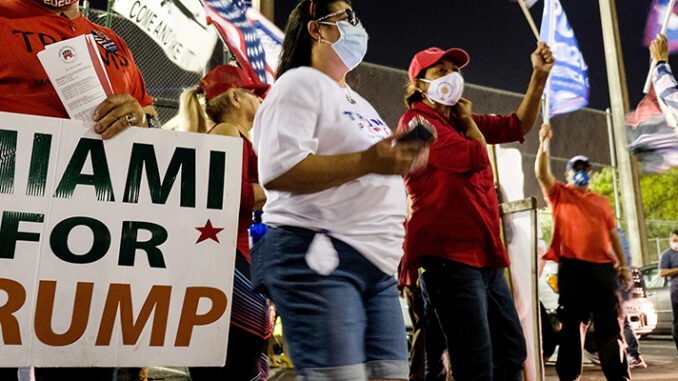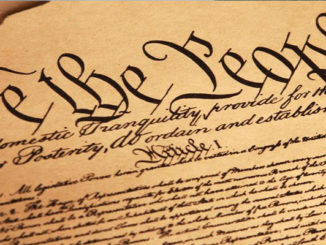
Latinos have divergent views about racial identity, but still see themselves as a group.
by
The reaction of the conservative writer Andrew Sullivan also found echoes on the center-left: “Whatever happens next, this has been a crushing defeat for left racial identity politics,” he tweeted as the results came in. “If Trump wins because of Latino voters it strikes the heart of an entire worldview.” That worldview supposedly holds that people of color vote as a left-leaning racial bloc — and that to galvanize their votes, Democrats should appeal to them as people of color who face a common threat from racism.
But neither the heterogeneity of the Latino population, nor the surprising support for Trump, should be taken to signal that racial identity is irrelevant among Hispanics or in American politics.
Beginning this past spring, my research partners and I explored political attitudes among Latinos through focus groups and a nationally representative survey. When it came to candidate preference, we found that 25 percent supported Trump and 60 percent favored Biden — not far off from the exit polls (especially considering that 15 percent in our cohort were undecided). We also asked participants in the project about other issues, including racial identity. We found that, more than any other factor — more than having family from Cuba as opposed to Mexico, more than age, more than gender — support for Trump correlated with conceptions of Latino racial identity.
It’s common to conceive of Latinos as “people of color.” Indeed, most progressive Latinos see themselves that way and urge others to see the larger group in the same fashion. Certainly, this used to be my perspective. But this is not how the majority of Latinos understand the group.
In fact, we found that Latinos hold a wide range of views on the subject. Given a choice among three statements, a quarter agreed that Latinos were “more like African Americans who over generations remain a distinct group.” In contrast, 28 percent minimized the importance of race, seeing Latinos as a group that “over generations can get ahead through hard work.” The largest share, however, 32 percent, endorsed the statement that Hispanics were “more like immigrant groups from Europe who over generations become part of the American mainstream” — that is, they claimed something like a White identity. The remaining 15 percent were unsure.
These divisions are key to understanding Latino support for Trump. Those who saw Latinos as similar to African Americans backed Biden over Trump by a margin of 61 percentage points (74 percent to 13 percent). But those who did not see Latinos that way favored Biden by only 24 points (56 percent to 32 percent).
These differences, however, do not reflect a desire among some to disaffiliate from the Latino community. In fact, when we asked “how strongly do you identify with other Hispanics and Latinos living in the United States,” those saying they saw Latinos as akin to European immigrants were the most likely to answer “extremely strongly.” What seemed to matter most was people’s resistance to a worldview that described them as belonging to a despised group.
This emerged initially in the focus groups, where we asked people to discuss how Trump talks about Latinos. The president’s basic political strategy involves encouraging Americans to fight among themselves. Even during a pandemic and a recession, he uses charged rhetoric about race, gender, immigration and religion, while promoting a sense of conflict between urban and rural America, and blue vs. red states. Trump pushes voters to think in terms of good and bad people, builders and takers, true Americans and violent invaders. He turns participation in American life into a competition for a limited supply of status.
As with other groups, many Latinos respond by mentally locating themselves among the “good” people, as defined by Trump’s rhetoric. In the focus groups, this translated into efforts to shift his attacks away from themselves and onto other Latinos. In a Gen Z focus group (eligible voters ages 18 to 23) in Miami, where there are relatively few Mexican Americans, one young man told us that the president “is against Mexicans illegally immigrating into the United States.” But, he continued, Trump “sees us differently” — probably defining “us” as legal immigrants or as people from places besides Mexico.
We found in our survey resistance among Latinos to seeing themselves as primarily being allied with people of color. We asked whether, to combat discrimination, Latinos should “build a coalition with other people of color” or instead “build a coalition that includes all groups, whites too.” Even among those who saw Latinos as analogous to African Americans, respondents preferred a coalition that included Whites, 54 to 38 percent. This jumped to 69 vs. 23 percent among those who described Latinos as akin to European Americans.
There are two points here. One is the reluctance of most Latinos — at least in our study — to limit their self-definition to “people of color.” But the other is even more important, especially in the context of the first: However they view themselves, to fight racism Latinos want to join with others.
It’s true that status concerns among Latinos make some susceptible to Trump’s rhetoric. For more than 50 years, Republicans have weaponized insecurities and resentments, especially around race, creating in-groups and out-groups. Trump has mastered this strategy, which appeals not only to a majority of Whites but also many typically seen as people of color. Understandably, often people want to associate with the groups accorded higher status by our political leaders. But it’s also true that there are two ways to build status: by punching your neighbors down or by lifting them as you climb. And we found plenty of evidence of a desire for cross-racial solidarity. Whether they saw Latinos as like European immigrants or akin to African Americans, roughly 9 out of 10 Latino respondents agreed that “we should pull together to demand that government work for working families, whether we’re Brown, Black, or White.”
The lesson from divergent views among Latinos may be that we should think of race not in terms of fixed identities but in terms of complex beliefs about belonging, respect and threat. Every society has its status hierarchies, as sociologists would put it, and members of each ethnic and racial group seek a place within those hierarchies. Contrary to what those like Sullivan argue, ignoring identity is never an option, particularly when political leaders promote racial conflict.
Like everyone else, Latinos care about the economy, health care, the climate and racial justice — and they also want to belong. I used to think it important that Latinos “belong” by seeing themselves as part of a subordinated group. But our research shows that insisting on a common identity as people of color can be a stumbling block to a bigger sense of belonging: one rooted in a shared commitment to fighting racism and lifting up all communities.
.
Ian Haney López is a law professor at the University of California, Berkeley, and the author of “Dog Whistle Politics” and, most recently, “Merge Left.” @IanHaneyLopez



